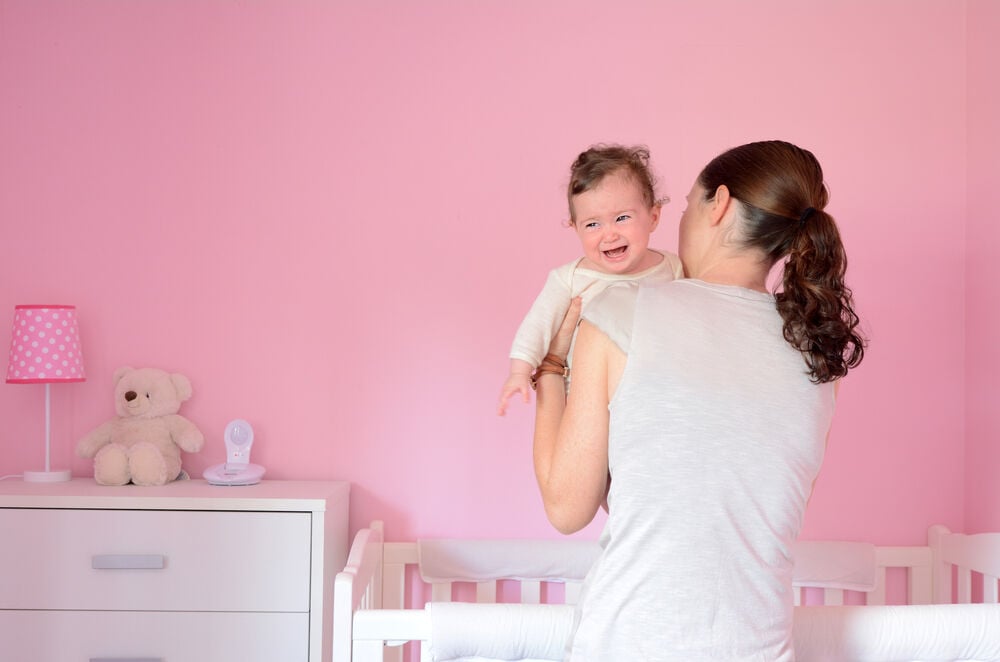Separation anxiety often occurs as part of the normal emotional development of your baby. This stage usually corresponds with the understanding that people and things exist even when your baby can't see them. It can also occur at night, which can be challenging for parents. We've gathered some simple tricks to help your baby get through this development stage more easily. Read on to learn how to deal with your baby's separation anxiety at night.
-
Tracking cycle
-
Getting pregnant
-
Pregnancy
-
Help Center
-
Flo for Partners
-
Anonymous Mode
-
Flo app reviews
-
Flo Premium New
-
Secret Chats New
-
Symptom Checker New
-
Your cycle
-
Health 360°
-
Getting pregnant
-
Pregnancy
-
Being a mom
-
LGBTQ+
-
Quizzes
-
Ovulation calculator
-
hCG calculator
-
Pregnancy test calculator
-
Menstrual cycle calculator
-
Period calculator
-
Implantation calculator
-
Pregnancy weeks to months calculator
-
Pregnancy due date calculator
-
IVF and FET due date calculator
-
Due date calculator by ultrasound
-
Medical Affairs
-
Science & Research
-
Pass It On Project New
-
Privacy Portal
-
Press Center
-
Flo Accuracy
-
Careers
-
Contact Us
How to Deal with Separation Anxiety in Babies at Night


Every piece of content at Flo Health adheres to the highest editorial standards for language, style, and medical accuracy. To learn what we do to deliver the best health and lifestyle insights to you, check out our content review principles.
Why does separation anxiety happen at nights?
Separation anxiety is a normal part of your baby's emotional development. Separation anxiety usually occurs when your baby understands that you exist even when you aren't around. Because their sense of time is still maturing, they can't calmly wait for you to return. Separation anxiety at night is no different. It can also occur because of strange noises at night or over-attachment to parents.
From an evolutionary standpoint, separation anxiety makes a lot of sense. A defenseless child will naturally feel anxious and get upset when left alone or taken away from their guardian.
Separation anxiety at night usually starts when your baby is around 6 months old and peaks between 10 and 18 months. It usually gets better by the time your baby turns two. Separation anxiety can lead to disrupted sleep. During this phase of emotional development, your baby may get up several times during the night and cry for you or your partner. It's common during these times of distress for your baby to express a preference for one parent over the other.
Separation anxiety at bedtime

If your baby suffers from separation anxiety at bedtime, it might make every night a struggle for both of you. Even well-adjusted babies experience separation anxiety, and most babies also experience fears during the night. A fearful baby may need your help to soothe and calm them. Children's brains aren't mature enough yet to rationalize fearful and distressing emotions. They don't yet have the cognitive abilities to cope with them.
Take a quiz
Find out what you can do with our Health Assistant
Panic attacks at bedtime: how to handle it
Your child's fear of being separated from you during the night is quite real for them. To help calm them, try to make the hours that lead up to their bedtime as peaceful, fun, and nurturing as possible. You can spend extra time with your child before going to bed, snuggling, reading, and singing together.
If your child cries for you after you've put them to their bed, it's okay to go to them. This reassures them (and you!) that your baby is fine. However, keep your visits boring and short so that your baby learns to return to sleep without needing much assistance from you.
One way to handle fear around bedtime is to comfort your baby when they are scared. You can stay with your child in their bed, hold them, and remind them that they are safe.
You can also encourage your child to look to a favorite toy or blanket for comfort. They can keep this object with them in their bed, and it may help them feel more relaxed at night.
You can also ease worries around bedtime by teaching your baby relaxation techniques. An excellent one is to practice replacing frightening thoughts with images of safety and happiness. If your child feels scared during the night, have them close their eyes and imagine a calming scene. You can tell them a story related to the image, and after some time, you may notice they've drifted off to sleep.
I got Flo last year in hopes of getting pregnant again after 15 years and me being 37, so I entered my stuff in and it told me when I was most fertile! And just 2 months of using this app I was pregnant!! I now have a healthy baby girl, and using the app again to try for another baby! GET THE APP IF YOU WANT TO GET PREGNANT!!
How to deal with child anxiety at night: 6 tips
Try these tips for dealing with separation anxiety in babies at night:
Talk to your child
Talk to your baby about what you're going to do together when they wake up in the morning. This can help ease some of their separation anxiety at night. For instance, you might say something like, "When you wake up in the morning tomorrow, we'll go to the park together to play."
Use their favorite toys
You can try leaving something with your child that they find comforting and associate with you. It might a piece of clothing that smells like you or one of their favorite toys. This can help reassure them during the night and ease the separation anxiety at bedtime when you aren't with them.
Always say goodbye and greet them
Give your child lots of hugs and kisses when you put them down to sleep for the night. Wave goodbye happily and confidently, and smile. Try not to let your own fears and anxieties show. Similarly, greet them with a smile and hug when you wake them up in the morning. By providing your child with positive experiences of saying goodbye and then having cheerful reunions, you're teaching them important life lessons. Keeping the goodbyes short and decreasing the transition time can also help ease your baby's anxiety.
Show your love

When you are putting your child down for the night, give them your full love, attention, and affection. Promise them that you'll see them in the morning when they wake up. Keeping your promise every day builds their trust and helps make them independent. When it's time to leave, quickly and calmly say goodbye and leave the room, regardless of what they might try to make you stay.
Play peek-a-boo games
To ease separation anxiety, you can try playing peek-a-boo games with your baby. This helps reinforce your baby's understanding that you always come back after you leave. They will eventually understand that you will also come back in the morning after being separated during the night. You can also tell stories about dolls or toys who go on small journeys. You can hide them and then reunite them with your baby to reinforce this idea.
Remember: it won't last forever
Remember that this phase of separation anxiety at night is temporary and will ultimately pass. Separation anxiety in general usually gets better by the time your baby turns two. If your baby is naturally shy or has stressors of other kinds, their separation anxiety might be more intense. If your baby has excessive or persistent separation anxiety, you can ask your doctor for advice.
Separation anxiety occurs as a part of the normal emotional development of your baby. It can also occur at night, making it challenging for parents. Separation anxiety at night can result in disrupted sleep, but there are steps you can take to ease your child's fears.
You can talk to your child about what you're going to do in the morning, leave favorite toys with them, make a routine of goodbyes and reunions, show your love, and play peek-a-boo games with them to ease their separation anxiety at bedtime.


Hey, I'm Anique
I started using Flo app to track my period and ovulation because we wanted to have a baby.


The Flo app helped me learn about my body and spot ovulation signs during our conception journey.


I vividly
remember the day
that we switched
Flo into
Pregnancy Mode — it was
such a special
moment.
Real stories, real results
Learn how the Flo app became an amazing cheerleader for us on our conception journey.




